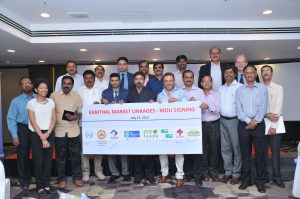Government of Karnataka Partners with Private Sector for Ramthal DMAC (Drip to Market Agro Corridor)

Karnataka, July 15, 2017 – The Government of Karnataka signed Memoranda of Understanding with six private sector companies at a Ramthal DMAC workshop in Bengaluru jointly organized with 2030 WRG, with representatives from the Departments of Water Resources, Agriculture, Horticulture, Watershed Development and the private sector.
The private sector companies which signed the MoUs included:
- ADM AGRO INDUSTRIES DHARWAD PRIVATE LIMITED
- NEO FOODS PRIVATE LIMITED
- GLOBAL GREEN COMPANY LIMITED
- RSM HiTech Feeds
- KRISHI ORGANIC PRODUCTS PRIVATE LIMITED
- JAIN FARM FRESH FOODS LIMITED
Managing Director, Krishna Bhagya Jala Nigam Limited, Water Resources Department, Mr. Anjum Parwez, underscored the significance of the MoU, “The workshop is a significant step forward by Government of Karnataka and the private sector companies towards strengthening market linkages for the project areas covering Drip Irrigation, and to sustain the area as a world-class horticultural and agricultural center of international repute.”
He further added, “We are confident that the progressive step taken by the six private companies will encourage more private companies to come forward and partner with the Government of Karnataka to improve the agro-economics of farmers of the Ramthal project area, followed by other drip irrigation projects.”
Building upon the concept of the Ramthal project, the Government of Karnataka’s Agriculture, Horticulture and Water Resources Departments, in partnership with 2030WRG, is promoting the scaling of drip adoption through a corridor approach linked with market-based mechanisms for offtake, targeting up to 500,000 hectares of drip irrigated areas in North Karnataka, termed the Drip-to-Market Agro Corridor (DMAC). In addition to Ramthal, the corridor will cover projects such as Koppal, Singatalur, Poorigali, and Savanur. DMAC combines a dual focus on promotion of drip irrigation, along with partnerships with agribusiness companies, input providers, financial institutions, and technology companies, in order to:
- Provide channels for off-take of farm produce, thereby improving farmer livelihoods;
- Support market linkages focused on high-value and water-efficient agricultural and horticultural produce through retailers, exporters and processing units, justifying the original government investments into the projects;
- Benefit from economies of scale on the development of needed infrastructure for post-harvest management (e.g. agri-processing zones, poly houses, cold storage);
- Accelerate agricultural extension services for good agriculture practices, mechanization, finance facilitation and knowledge transfer.
The objective of the partnership is to optimize benefits to the farmers on the unique investments made by the Government of Karnataka, and to provide the private sector a stable and structured environment to establish a sustainable supply chain for high-value crops, with assured and efficient water supply. Potential support schemes from the government include Public-Private Partnerships for Integrated Agriculture Development (PPP-IAD) and Rashtriya Krishi Vikas Yogana (RKVY) programs, as well as office facilities and support services from the KBJNL (including a dedicated and outsourced Market Linkages PIU – Project Implementation Unit).
Secretary to the Government, Departments of Agriculture and Horticulture, Karnataka, Mr. Maheshwar Rao, highlighted the need for market linkages for agriculture, “Market linkages for agriculture-based projects ensure that the farmer has adequate avenues to sell agricultural produce, serving as an important part of the agriculture extension process. We thank 2030 WRG for their assistance in setting up these collaboration models for farmers, who will benefit from partnerships with private companies.”
